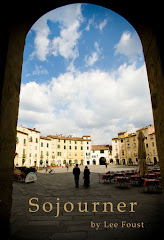Chapter Fourteen: The House of Pain
I, the reluctant novelist, compose this fake novel from a
place of suffering. Every word hurts. It’s unfair of Trumpistan to make me
think like this and, worse still, to have to write like this. In your privilege
as a reader you’ve put me to work as the conscience of a nation—a nation I’ve
abandoned on at least three separate occasions. I don’t feel like I can go on
with this much longer—yet what choice do I have? The falsity must be told.
Someone has to call us all to account for our complicity in the Human Centipede
Administration—and I appear to be the last novelist standing.
Fuck you for that, for taking away
my artistic freedom and respect for literature.
I’m done with myself. Literature
swallowed me whole a long time ago. My voice is hoarse. I appropriate the
shrill whine of the political pundits I detest and speak from the house of pain
where Dr. Moreau created me and all of the other manimals. Even the Sayer of
the Law has abandoned us this time, replaced by a big-eared dwarf who,
emulating Pontius Pilate, washes the dirty paws that shook Drumpf’s tiny hand
in a devil’s bargain to keep US law as racist as possible.
All that these Centipede segments
seem to want to do is to get back at the cool kids who laughed at them in high
school, the ones who smoked pot and had sex. These are the two big hangups
these stunted momma’s boys never seem to grow out of. Of course they blame it
all on Jesus. (Really they hate the Savior ‘cause He watched them jerk off with
His omniscient eyes. So it’s really only guilt that keeps them kissing his ass
in public, just like Drumpf kisses Putin’s ass, then they deny his every
commandment with their politics like Peter before the crucifixion.)
*
* *
Otherwise, what? Mathias (of my writers group) says I only
want to annoy people, or to get a rise out of them, by writing this bullshit.
It’s possible. He also says I’m sometimes funny. He’s still caught up in the
intentional fallacy: he believes I’m in control of what I write (“Just like
soldiers believe they’re in control of a war,” sing that elecro-pop group I
mentioned earlier). But you can’t make this shit up—it’s happening in real/fake
time.
Yet
Mathias would claim that I still have free will and could choose to write
anything I want, anything other than this political bull honkey.
Free will,
as a concept, is the basis of judgment and most monotheistic religions.
Monotheists claim that it is God’s right (His duty!) to punish or reward our
souls after death for lifetimes spent on Earth inside bodies doing stuff. But
moralism’s kettle of worms is spilling out all over the kitchen table. The
weight of judgment crushes us when our laws are skewed against the poor and
only enforced upon those who can’t afford a lawyer. We store this oppression in
our hearts and pass it on to our descendants. Judgment falls on me for writing
this crap just as, in my nostalgia for morality, I heap a multitude of sins on
the Drumpfster and all the real/fake public figures I appropriate here in
imitation of Dante’s judgmental fake novel, The Self-Righteous Comedy.
I’ve been rewriting Dante longer
than Dante wrote Dante in the first place. (Behold another postmodern miracle!)
Responsibility is always outside us,
a wall upon which we lean. Responsibility can no longer be “taken.” It’s become
a thing static and moot, crushed beneath the spectacle.
* * *
My writerly desire to prick your conscience, to add to the
chorus of literature, preach to the choir, and engage other languages in
self-defense of their assaults on fact and logic, remains inexplicable.
(Unless, like Flip Wilson’s Geraldine character, the devil is making me do it.)
For surely I’m not as bad as my nation’s leaders proclaim me to be in all of my
elitist/liberal/taker glory. They’ve ruined my reputation as an American—by
association with hillbillies—all over this continent. Europe is so stunned by
Trumpistan it can’t make up its mind whether to laugh or cry.
Such is the work of the novel: to
try on other voices and languages like shoes. Or perhaps to sift through
rhetorical styles, making room for the voices of conformity and protest until
the novel makes some sense of the chaos of individuality that has emerged from
our treasured plurality, “We, the people.”
Society against the state, words
against language; throwing shit against a wall until something sticks. Maybe
the only value we ever find in living comes from the shortcomings of language
to save us—the conscience behind the text’s composition, the form of a novel
that speaks in-between the collected monologues I here repeat, assassinate,
regurgitate, and negate with parody and indignation.
* *
*
No
wonder emigration is the natural state of novelists—we’re always looking for
new languages, foreign terrain, and novel rhetorical forms to contradict the
old ones. No single country is enough for us, no one language; no lone point of
view is ever compatible with our search for meaning in all this chaos.







No comments:
Post a Comment